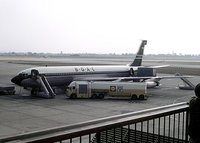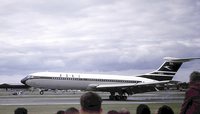British Overseas Airways Corporation
|
|
The British Overseas Airways Corporation (BOAC) was the exclusive British state airline from 1939 until 1946 and the long-haul British state airline from 1946. The company started life with a merger between Imperial Airways and British Airways Ltd. BOAC was merged with British European Airways in 1974 to form British Airways, following a British Act of Parliament in 1971.
During the 1930s, 1940s and until November 1950 Imperial Airways and then BOAC operated flying boat services from Southampton to colonial possessions in Africa and Asia. Aeroplanes such as the Short Empire and Short S.8 Calcutta flying boat were used to transport passengers and mail.
In May 1952, BOAC became the first airline to use a passenger jet, the De Havilland Comet. All Comet I's were grounded in April 1954 after three BOAC Comets crashed. Investigators discovered serious cracks in the planes' structures. The cracks were caused by metal fatigue due to the repeated pressurization and depressurization of airplanes as they ascended and descended. De Havilland engineers then designed an improved Comet, which was called the Series 4. In 1958, BOAC used the new Comets to become the first airline to fly jet passenger services across the Atlantic.
BOAC also operated the Vickers VC-10 and Boeing 747, and would have become one of the first operators of the Concorde had it not merged to become British Airways (one of BA's Concordes carried the registration G-BOAC).
BOAC is mentioned in the first line of The Beatles song "Back in the U.S.S.R.". A song by electronic music group Autechre is titled Under BOAC.
|
Lists of Aircraft | Aircraft manufacturers | Aircraft engines | Aircraft engine manufacturers Airports | Airlines | Air forces | Aircraft weapons | Missiles | Timeline of aviation |


